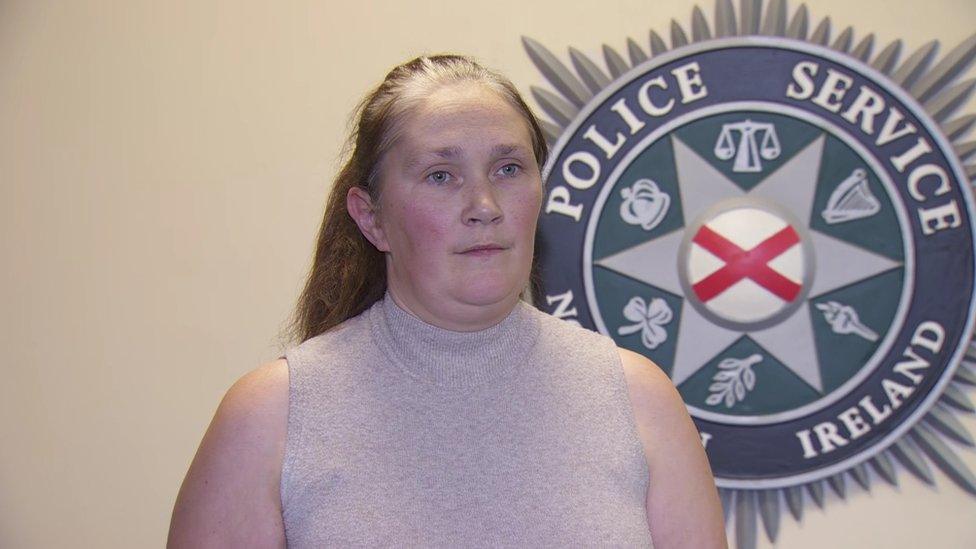Stalking: 'Victims like me still face hurdles despite new law'
- Published

The new law brought Northern Ireland into line with others parts of the UK where anti-stalking laws were already in place
A victim of stalking has said people in similar circumstances still face many hurdles, despite a law criminalising the offence in Northern Ireland.
It was introduced a year ago and police said more than 80 alleged stalkers have been arrested since.
The legislation brought Northern Ireland in line with other parts of the UK.
The victim told BBC News NI the law might have helped her, but there were still barriers.
"People don't always have much sympathy if you haven't been punched or kicked," she said.
Speaking anonymously, she described stalkers as professional manipulators.
"I live in hope that there is a solution for stalking, maybe more education, but I don't really know what the solution is," she said.
"Even with this new law there are still so many hurdles for victims."
'A mental battle'
Police have arrested 88 alleged stalkers and charged 47 people since the law was introduced.
Under the new legislation, convictions for the most serious offences carry a penalty of up to 10 years in prison.
"You feel completely and utterly alone, it's a mental battle," the victim said.
"I was so tired from lying awake at night, afraid to close my eyes in case my phone rang again or the doorbell went.
"Sometimes you question yourself - is this all in my head?"
'Fearing for my life'
Another victim described how her stalker took away her feelings of freedom.
"[I was] living with looking over my shoulder, at times fearing for my life," she said.
"On one occasion I had 155 WhatsApp messages in a few hours and was also receiving messages on two other platforms at the same time."
On another occasion the stalker started playing music through the victim's speaker in her home, despite him being 15 miles away.

Breakdown of arrests by district:
Belfast - 20
Newry Mourne & Down - 15
Armagh, Banbridge & Craigavon - 9
Antrim & Newtownabbey - 9
Derry City & Strabane - 8
Mid Ulster - 6
Causeway Coast & Glens - 5
Lisburn & Castlereagh - 4
Ards & North Down - 4
Fermanagh & Omagh - 4
Mid & East Antrim - 4

Det Supt Lindsay Fisher said police were asking the public not to ignore the "red flags", adding that stalking is not just someone "lurking in the shadows".
"If someone's behaviour towards you is fixated, obsessive, unwanted and repeated, this is stalking," she said.
"Stalking can actually take many forms and can be online as well as in person and could be someone known to you or a complete stranger."

Det Supt Fisher said stalking often results in fear, trauma and, in some tragic cases, murder
Det Supt Fisher described it as "an insidious crime that takes over and destroys lives."
She said statistics showed people suffered up to 100 incidents before reporting stalking - and it could be someone the victim knows or a complete stranger.
"It often results in fear, trauma and a reduction in the victim's quality of life, in some tragic cases it has resulted in murder," she said.
"Over 4,500 officers and staff have now been trained to recognise and respond to these crimes and we will continue to use every tool at our disposal to bring offenders to justice."
'Don't suffer in silence'
Foyle Women's Aid and Family Justice Centre chief executive Marie Brown said she has first-hand experience of stalking and that people should not suffer in silence.
"I myself as a staff member here have been stalked by somebody because of the work we do and because of the help we were giving in a certain case," she told The North West Today.
"It was very frightening and very intimidating because it was somebody following me around and stepping in when I was having coffee with a friend and saying I need to stop.
"There was a whole range of things and it wasn't pleasant."
Ms Brown said that people affected by stalking in Northern Ireland should report it in the first instance to the police and that agencies like Women's Aid are also there to help.
"Please come forward to us if you need help, we will help you, the legislation is there to protect you and please don't suffer in silence," she said.
Sarah Mason, chief executive of Women's Aid Federation NI, campaigned for the introduction of the legislation.
"We are very clear of the direct links between domestic abuse and stalking, often making leaving a coercively controlling relationship very difficult," she said.
"Many of the women we support would often experience stalking behaviours from their perpetrator as they try to break free from the abusive relationship."
Ms Mason said she expects to see more people prosecuted under the stalking legislation as it becomes more widely known to the public.
- Published22 February 2022
